Mindful Marketing – Less BS Equals More Sales
There's no doubt marketing is an integral cog in the day-to-day running of an online business.
But while we're all in it to sell, make a profit, and ultimately grow, it's still important to maintain a sense of integrity and ethics.
In this episode of Start Yours, we speak to Amie Finlayson, an expert in digital and ecommerce marketing. Together, we dive into ethical marketing, what it is, and how online entrepreneurs can apply it to their businesses.
We tackle the role of pricing as well as copy and how these can be tweaked so that you're marketing and selling ethically.
If you're enjoying our interviews, don't forget to check out the Oberlo blog as well. And we hope you'll consider subscribing to our podcast.
Want a summary of our chat? Here's a seven-point TL;DR version:
- Making unethical marketing choices in your business harms you down the line more than anyone else.
- Pricing is a positioning strategy, and what goes into your positioning strategy is essentially your ethics.
- Really understanding your ideal buyer is going to help you price in a way that's ethical.
- If your copy reads like you're taking advantage of your buyer, it's probably not what you should be leading with.
- Having brand values help you sell better and help you down the line.
- Competitive messaging that paints someone else in a negative light is not ethical marketing.
- If we stop looking at marketing as so focused on problems and more focused on solutions, we will have better language and people will feel safer making decisions they feel have been informed about rather than forced.
Start Yours is a podcast about ecommerce, dropshipping, and all things launching a business.
Join us as we meet entrepreneurs who have gone through the triumphs and headaches of running an online store, and learn how they managed to survive and thrive.



What Is Ethical Marketing?
Aleisha: Amie, thank you so much for joining me on Start Yours. I'm excited to talk about marketing and branding, and how we can communicate better with our customers or clients. But firstly, thanks for being on the show.
Amie: Thank you for having me. I'm really excited to be here and especially to talk about ethical marketing, which is my favorite topic of all.
→ Click Here to Launch Your Online Business with Shopify
Aleisha: Yes. Well, let's start with that because when I first learned about what you did, I was like, "This is actually very intriguing," so I think a lot of people want to do what you put out there but don't really know what it is and how to do it really. So, let's talk about what ethical marketing is and how you came to be doing what you're doing.
Amie: Yeah, for sure. I think ethical marketing, as a concept, has always been there. But probably not at the forefront as much as other types of marketing because it is an alternative way of doing things, especially in online business where everything is kind of the opposite because it is done in a way to make the buyer make a really quick decision.
When I first started an online business, it was about... I'm in my fifth year now, which is crazy to think about, but when I first started, I was sucked in by all of the kinds of marketing that I try to repel now.
But that was about the hustle mentality, that's just about manipulating stories and shaming buyers.
And this is done really subtly in a lot of ways, so it's not... The people that use these marketing tactics aren't bad people, for the most part, but it is a way where marketing is done to essentially gate-keep so that people feel really compelled to make decisions and be impulse buyers so that marketers and entrepreneurs can make money in a really quick way. And that's just one example of ethical marketing there.
A lot of other ways that people do this, there's pricing that can manipulate people into making decisions. There is storytelling, there are ways that communities are formed so that people make decisions in ways that aren't right for them.
And it's not just about decision-making, there are lots of things that are done to sell products and services in ways that just ethically they don't sit right with me and a lot of other marketers, but yeah, it's a sliding scale, of course.
Aleisha: Yeah, it is a sliding scale. And I think, as a consumer, we are served ads so many of our online experiences, especially with Instagram and Facebook and the way that they've now structured their platforms, it's very hard to know what's an ad and what's a genuine post.
And also the content in those ads can sometimes... Are designed to make us feel bad about a personal circumstance or a problem and then sell us something, which I realize the fundamentals of marketing, or selling a product, it's like: find something, solve a problem, give a solution.
But also by making someone feel pretty bad about themselves or their personal circumstances. It's not great. It's not that positive really.
Amie: Exactly. And I feel marketing doesn't have to be that way, but it always has been. So, I think challenging the status quo and the things that online business has come to cultivate is a really good way to think about your own marketing and the way that you are making other people feel because making unethical marketing choices in your business harms you down the line more than anyone else.
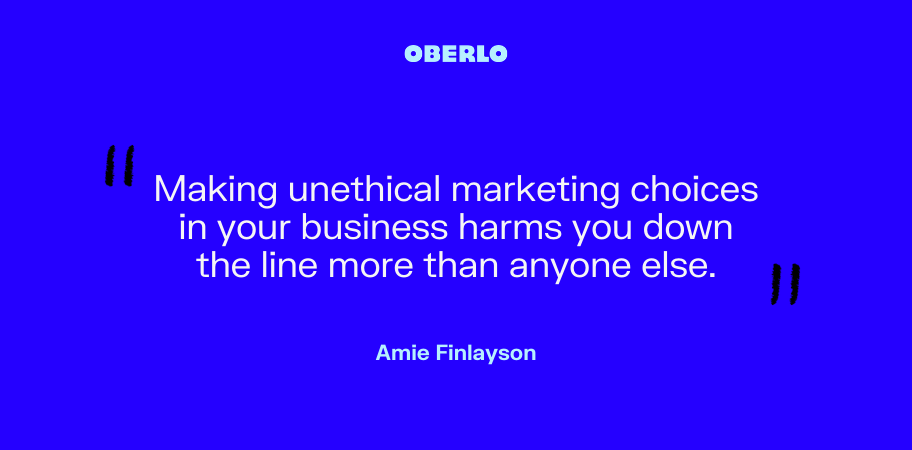
Aleisha: Yeah. Yeah, exactly. And I think a lot of our listeners are selling physical products, or they're running online businesses and really struggle with the idea of sales, and marketing their product without it feeling skeezy or sleazy.
Let's talk about how you came to make this decision in your career, to move into this and help people rewrite their marketing, I suppose, and how they sell themselves and their products. And how we can then transpose that into helping our listeners maybe take that step as well in what they're doing.
Ethical Marketing Guidelines
Amie: Yeah, for sure, because I don't think it's just something that magically comes to you. You don't just start a business on day one and you know everything and you...
Aleisha: No.
Amie: And especially in terms of being ethical. When I first started my online business, I'd been in marketing for two years. I'd been at uni, I was doing internships, and the reason that I wanted to start freelancing and start doing my own thing was that I didn't wanna work a nine-to-five and I wanted to make more money. And that was my main goal.
I wasn't thinking about the way that I could impact people in a really positive way.
I wasn't thinking about what I do now, where I'm able to essentially help people in their businesses in a way that changes their life in some way. I wasn't thinking about that at all. I was just like, "Me, me, me. How can I grow this?"
And then I was able to evolve as a business owner and a person because I think business is just the biggest personal development project you could go on. But I was able to question a lot of what I was doing. I really went internal with it when I did make the shift because I knew by speaking out about these things, I was leaving everything that I was doing open to criticism.
And I am fine with criticism when it is constructive. That's why I started my podcast. I wanted to have more critical discussions around the things that we do to grow our personal brands and to sell products and services.
I think the first place to really start is to think about what's important to you and what is important to the people that you are serving. So, ethics are very nuanced and everyone comes from different backgrounds and has different experiences, so we can't expect everyone to have the same ethical stance. That would be completely unfair and would just not be helpful in any way.
But I do think there are four things that you should consider when you are looking at your own ethical marketing guidelines.
I think having guidelines is the first thing to do. The first thing to think about is actually having a structure and thinking, "What will I accept and what won't I accept when it comes to business," starting with your pricing.
I think pricing is one of the biggest ways that people do manipulate people into making decisions. And because a lot of people don't consider that a buyer is at many different stages when they are making a decision, pricing is a way to make people essentially impulse buy, which my... In the way that I think about my own ethics, I want people to be buying things because there is a reason behind it, and they are empowered by that decision, essentially.
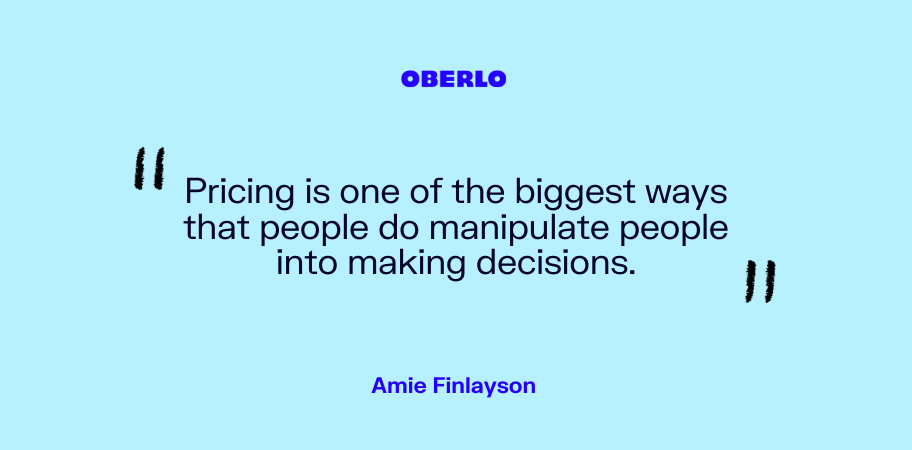
A very popular episode on my podcast is around charm pricing. And this is done in many, many different industries, and I think it's one of those gray areas. I don't think it's good or bad, but it is something to consider.
It's when, say, your product is $100, that's what you have decided it's worth. But instead of $100 you actually sell it for $97, or $98 even, or $95. So you're trying to make it...
It's a psychological tactic where you're trying to make it appeal less expensive than it is.
That's just one pricing tactic, but there are a lot of ways that people will bundle things together and say they're valued at $20,000 when potentially they're not if they are sold separately. No one's gonna buy all those products separately, first thing.
And the fact that people will value things that have never been sold, which I'm pretty sure there are some marketing guidelines in Australia where you can't do that. I think if you are saying something is valued at a certain rate, and then you sell it at another price point, then that is actually contradicting yourself firstly, and not ethical.
Aleisha: I was just gonna say to you, I was watching trash TV as... It's my passion. Probably House Hunters is something amazing that makes me feel really good.
Amie: Love it, yeah.
Aleisha: But, yeah, it's great. I go numb in a lovely way. But in the channel, they do have a lot of the infomercial sort of things. And I was... Interesting that you just started mentioning all these add-on things.
There was some sort of, I don't know, drill or something that they were selling and then they were like, "But if you buy now you get blah-blah-blah-blah-blah." And all this extra crap that you would think, "I don't really want any of that stuff. I don't really need it."
But, of course, as you said, the psychology behind it is, "Oh, but I'm getting all this stuff for free." Even though in my normal life I just wanna buy the drill. I don't need these 18 other extra bits that are gonna sit in your cupboard for six years and then you're like, "Where did this stuff come from?"
So, it really interested me that you mentioned that because that was like a beacon of consumerism that was sticking out for me recently and thinking, "We don't need all this extra stuff," and nor does it entice me to buy that drill when I just think about what the hell I'm gonna do with all that extra trash.
Amie: Yeah, I completely agree. That's what these tactics are designed to do. They're designed to overload you with things so it appears that you're getting a really great deal. But in reality, it's just things that you either don't need, you don't want, or you would have never have made that decision if they didn't put all of this other sparkly stuff into the bundle.
Ethical Pricing: Know Your Ideal Buyer
Aleisha: Yeah. So, when we're looking at pricing... I think pricing is such an interesting conversation 'cause a lot of our listeners are selling physical products that maybe other people are also selling, and it comes down to how you market that product to stand out from the rest, which I suppose is the basis of all capitalism and selling things.
Amie: For sure.
Aleisha: How do we assess... Let's just pick, I always go pot plants 'cause it's... I just love a pot plant and they've been a very popular item. Or pot plant holders, or whatever.
If we're selling Aleisha's pot plants, and we're thinking about the ethics of pricing and how we can also still run a business and stand out from our competition, but how do we go about thinking and considering our profit margins and pricing without being skeezy, and using these tactics that potentially aren't gonna get us ahead anyway?
Amie: Yeah, exactly. I think in terms of your pricing, I always say this, but pricing is a positioning strategy, and what goes into your positioning strategy is your ethics essentially. And, of course, we're all running businesses here, whether you sell this pot plant as your main product, or you're a marketer, you have to make money at the end of the day, and you have to make a profit in your business.
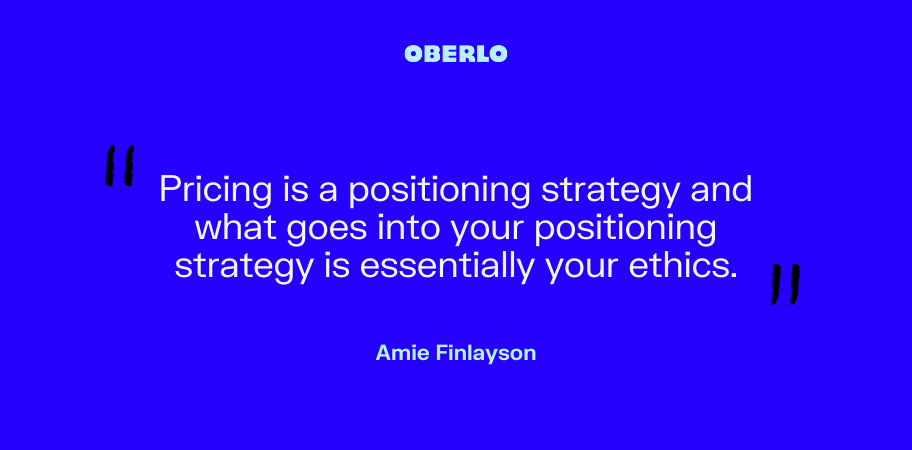
And one of the things that I always think about when people are thinking about what they should charge for their product, or their service, is the... I don't know if you've seen this, but there's the Tiffany & Co. Paper clip. Have you...
Aleisha: Oh, my gosh.
Amie: Have you had a look at that?
Aleisha: No. But I just feel gross now that you've just said that.
Amie: Yeah. So, this is thinking... I think when you are pricing, you need to think about who you are targeting your products to, and everything that goes into them making a decision. So the Tiffany & Co. Paper clip is exactly what's on the label.
It's a paper clip, and they sell it for $2,700.
Aleisha: Shut up. You kidding?
Amie: I am not kidding. You can Google that, and it's on their website right now, but...
Aleisha: Oh, my goodness.
Amie: And there are ethical things you could think about there. But for someone who is trying to sell a pot plant and that they are thinking about what they should price it, it's going to be more about who you're targeting.
Now, you could sell it for $2,700, if that was your positioning strategy. But if you are targeting... Knowing your ideal buyer, more than anything, is going to help you price in a way that's ethical.
Aleisha: This is a great point. And I'm just still getting over the paper clip. I'm just thinking I'll need a couple of minutes to think about the world and where we're at, where they're selling that sort of crap.
Amie: I know.
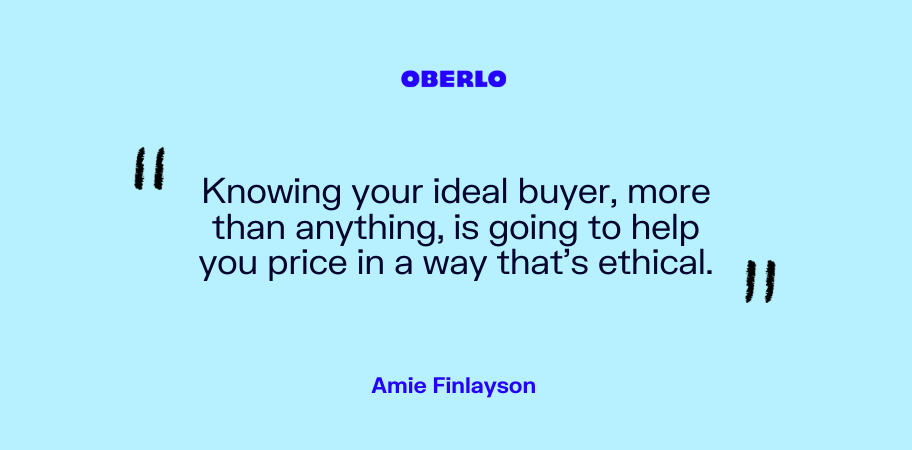
Aleisha: That's good. Okay. We're thinking about our audience, we're thinking about the value of our product, I suppose.
Tell me a little bit more about then, if we've priced our pot plant holder in the right way, how to then use your amazing ideology to then go into writing our copy, and selling our brand in a way that stands out from other brands without being gross?
Use Storytelling Ethically
Amie: Yeah, for sure. And I think that goes into a few of the other guidelines that I recommend just anyone looks at and forms their own kind of decisions on. But storytelling is a massive part of marketing, and there's a way to do it where you are inspiring people to take action, and then there's a way to do it when you're just straight-up manipulating people.
So, when thinking about your storytelling, you've got to be thinking about what you're leaving out.
A story that is familiar – and I've seen it in the dropshipping world – has been, "I had $25 in my bank account and now I'm a millionaire," which, that's great that you're now a millionaire. But what are you not sharing?
Who are you influencing by leaving this out? Who are you making buy your product, or your service, or your online course because you're telling this story that leaves out a lot of details? Say you did have only $25 in your bank account, and that's the story you're telling. What about the other stability in your life or the other privileges that you have?
And it doesn't need to be that your stories, your marketing, and your copywriting are completely raw and it's just the most transparent thing in the world where you're almost telling a sob story. It's not to do that. But it's thinking about: If your copy is taking advantage of the buyer, then it's probably not a good thing to be leading with.
And thinking about your ethics and having brand values is going to help you actually sell these products better and help you down the line.
If you are selling something with a story that is over-inflated, that is just gate-keeping, is limiting information, influencing people to buy something they wouldn't normally buy, then that's gonna cause you business problems down the line. You're gonna have more people asking for refunds, more people returning your product. You're gonna have more people just causing issues for you, really.
Aleisha: Yeah. The bullshit scale, I think, especially in dropshipping and ecommerce could be pretty far and wide. And I do agree, the bro market as we... I've been a big... It's been a big goal for me over the last year or so, is to really unpack some of the...
And we say "bro marketing," it's just, if no one's heard this phrase, you're a big advocate of shutting it down, but it's these usually dudes who sit on their Lambos, they tell their stories, as you said, that are often very puffed up with rubbish, and they're promising the world but they're not really giving any actual strategies or tactics to actually make that happen.
Amie: Exactly.
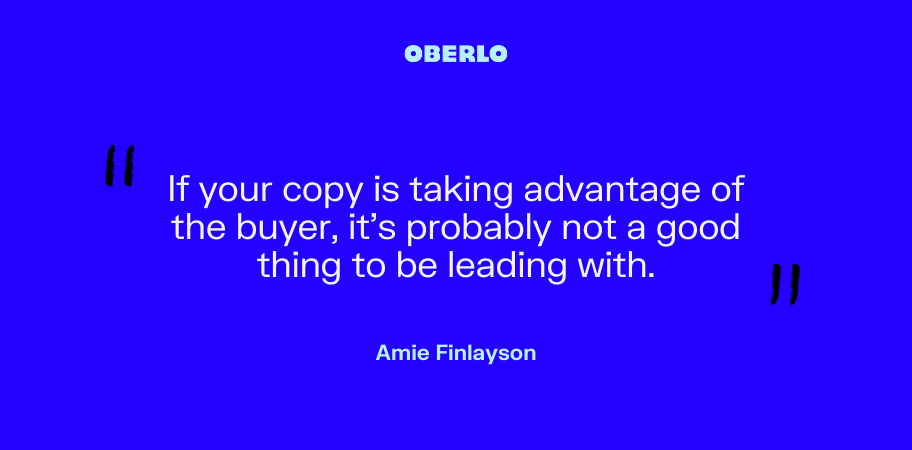
Aleisha: And people get sucked in because they use storytelling, as you said, it gives people hope that they can have overnight success, which is really unlikely and also something that's quite manipulative.
So, yeah, how do we shutter that out, especially if we're starting a business and we are... You mentioned on your website that you bought a lot of these courses. I've done the same thing, where I've gone, "Oh, this can help me." But also you get really... In the end, I felt I found it all quite overwhelming, with all the information that was being shared and not really very helpful.
So, how, if we are starting a new business, do we put the shutters up and not absorb all of that rubbish?
Amie: Yeah. I think it's really hard to not, especially when you are first starting because there's so much free information out there that is trying to suck you in so that you will buy their paid programs, which is a tactic and it is used and it can be used in an ethical way.
But we have really gotta think about if these people have ethics or values that align with ours, firstly, and before you go into buying anything, you should really be thinking firstly about, “Is this person credible. What is their background? Are the people that are giving them testimonials, are they truthful, are they based on programs five years ago, or are they recent? Are they relevant? Are they timely?” And just doing your own bit of background research.
Now, it's not always going to be possible. Sometimes you do get sucked in by a really good deal, and sometimes those programs are really good.
But it's just thinking about ways that you can decipher what's important to you, where you're spending your money, and where you're getting your information from.
Balancing Persuasion and Ethics
Aleisha: Okay. Then looking at if we're writing marketing copy and we're selling a product or a service, and we wanna really just make sure we're communicating while obviously still being transparent and honest to a point, but also still wanting to make a sale, you don't have to be disagreeable, and that's, I suppose, with the way you write copy.
But how do we go about writing something that's still persuasive but lacks a bit of the bullshit?
Amie: You really need to think about your sales language and how it influences someone to buy. Are you using fear-based tactics? Are you making someone feel bad so that they can make a decision? Are you discounting a whole lot of background, a whole lot of privileges, a whole lot of experience that they may not have?
And I think that comes into a lot of the offers that you create in your business.
So, before you even think about the copy and your Instagram captions and things like that, you've got to think about how you're actually packaging up these offers and how you can actually identify gaps in where people are at the stage of the buying journey, as I mentioned before.
Because I think, especially if we go back to that previous point of what information you are purchasing or who you are listening to, an early-stage entrepreneur is going to be very different… I consider myself to be an early-stage entrepreneur, and I'm in my fifth year now. But when I was six months in, I was completely different from where I was 12 months ago.
So, thinking about the copy that you are putting on your website and your social media, it's gotta be targeted at the person that you want to buy in a way that doesn't shame them, in a way that doesn't make them feel like they're making a decision because there is no other decision.
I think many marketers, and even... I guess, because people who are starting dropshipping businesses have product-based businesses, they are also marketers. In a way, you have to become the marketing arm of your company.
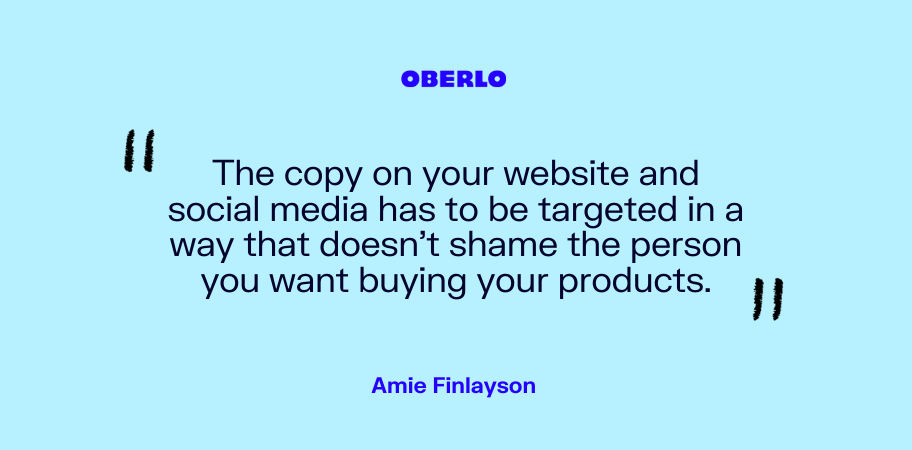
Aleisha: Yeah, I think it's a sole marketing situation, in a way, 'cause you're not developing. When you unpack what a successful ecommerce person is, it's really about marketing and strategy beyond also having a good product that people wanna buy, but really how you sell it and how you communicate that to customers.
And that's why we've seen so many people that are like, "Okay, I've got some flippy sunglasses that fold up and are cool." And someone... We've had a lot of people that are like, "Oh, I've had success with this." And a lot of people haven't had success selling the same product 'cause they've got a very different tactic and strategy behind their marketing. So, yeah, I agree with you, it's to really be part of the game.
Amie: Yeah, for sure. I think a lot of it is about marketing and branding and making sure that you have a point of difference. But in saying that, in your copywriting, your point of difference isn't... I think a lot of people use competitive messaging that paints anyone else in a terrible light so that they can sell their product as better.
But that is not the way to sell something in a way that is ethical.
It's more about creating something that you can share the benefits of, that you can be... Obviously, there are things in marketing where you are trying to hit a pain point. But I don't necessarily like the word "pain" here because it implies that you're trying to... I mean, you are trying to solve a problem, but it does imply that anyone who is buying has a problem. I don't go and buy, for example, a dress because I have a problem. I may, if I don't have something to wear or maybe retail therapy, things like that.
But I think if we stop looking at all of our marketing as being so focused on problems and more focused on solutions, then it's going to be better language and people are going to feel a lot safer, making decisions that they feel have been informed rather than forced.
Aleisha: Oh, I like that, Amie. That's really nice. It feels very positive. And also... I always think about, if you're starting a store, if you showed your friends, would you be something you'd be happy and proud of to say, "Oh, this is the thing I'm selling, this is how I'm selling it," and if there's an element of, "I feel a bit bad about this," or, "This feels manipulative," then maybe you need to step back and think, "What can I change, or what can I tweak to make it less skeezy or less... " Something that you're not proud of, basically.
Amie: Yeah, exactly. It's thinking, "Would I be happy buying from me?" Putting yourself in your buyers' shoes, reading through your sales page, and thinking, "Is this something that accurately represents my product, my values, what the experience is, my brand?" Yeah, there are many things that you can ask yourself.
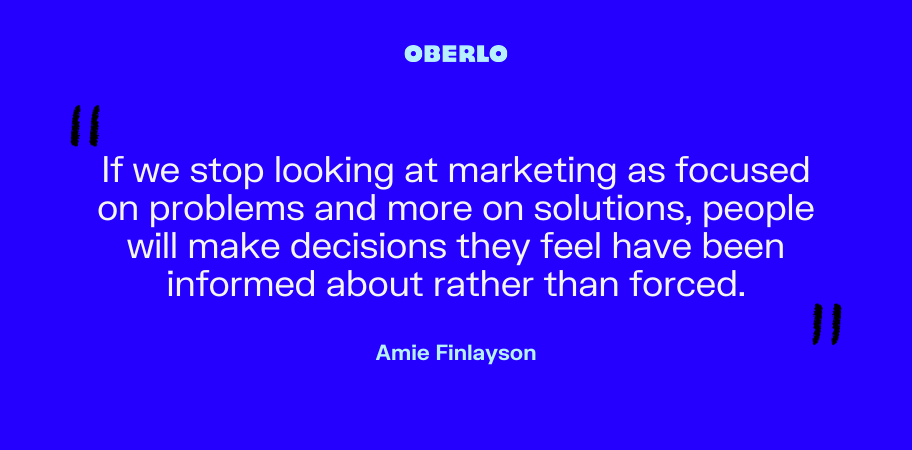
Aleisha: Now, you host a podcast, you've launched it recently. I've been listening and it's really good. The Good Authority podcast is where we can listen, and you do talk about this a lot more in depth.
You've done some great episodes that have given me a little kick to think about what I wanna present on my show, but also just about how we can empower people to make positive decisions when it comes to their business and also how they communicate, and not perpetuating this "bro" stuff, which is just boring after a while.
Amie: Yeah, it does. All of the messaging just ends up sounding the same. And on my podcast, I hope to continue to have discussions where people can talk about these things and decide what is ethical to them because it's not gonna be the same for all of us.
Aleisha: No, exactly. It's a malleable thing that, I suppose, depends on who you're selling to, who you are, and what your brand is as well. I hope people check it out, the Good Authority podcast. And also people can work with you.
Tell me a little bit about where we can get in touch and learn more about what you do. By the way, your website is fantastic. I would like to climb inside it, its colors are gorgeous.
Amie: Yeah. I feel like my... I wanted my branding to stand out in a way that was different from all of the bro marketing that you do see. There are no fancy cars on my website or I'm not holding any cash.
Aleisha: You're not sitting on a private jet. That's not really a private jet, that's really a fish.
Amie: I'm not, didn't rent a private jet for the day. But to work with me, I offer business and marketing strategy for marketers and entrepreneurs, so basically, anyone that is looking to create a sustainable business through a personal brand, through their content, through their social media marketing.
And I do that through... I have a mastermind that is currently enrolling, and you can go on to my website, amiefinlayson.com/mastermind. I also host a VIP Day, where we structure your entire business for growth in a day. And I'm always on Instagram, so send me a DM and I will definitely reply.
Aleisha: Yeah, that's fantastic. I think people, if you're investing in building a long-term business, and I know a lot of people who are dropshipping will... They rotate and they do a different brand building, but it is good to have some sort of, obviously, brand integrity and to build something that is going to last, rather than just flash-in-the-pan rubbish. So, I highly recommend people get in touch and learn a bit more about what you do.
Amie, it's been a delight to chat with you, and I hope people go away thinking a little bit more about the wording of their marketing, but also just about the ethics of what they're doing, running their businesses 'cause if more people do that, I think we probably have a little bit more trust in the industry and also feel comfortable that what people are selling is exactly what you're gonna receive in the mail or in a course.
Amie: Exactly, agreed. I think... And then their businesses will be better for it, too.
Aleisha: Yeah, you're gonna make more money. If you're selling less rubbish and marketing stuff that doesn't exist, then...
Amie: Yeah, less stress.
Aleisha: Exactly. Ultimately it'll come out. That's good. All right, Amie, thank you so much again, and I hope people check out the podcast and change the game with their marketing.
Amie: Awesome. Thank you so much.


